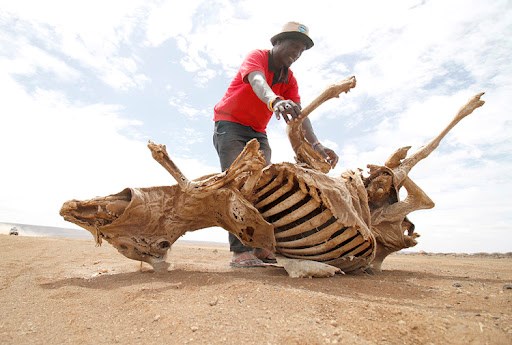
by GILBERT KOECH
Tuesday October 11, 2022

Kenya Red Cross volunteer Elelo Galmagal examines the carcass of a camel that died due to severe drought in Ebeso, Marsabit county.
Image: FILE
The drought situation in the country has continued to worsen with reports indicating that, 4.35 million Kenyans are going to bed hungry.
This indicates that several Kenyans are in dire need of humanitarian assistance.
The hunger crisis comes on the back of a series of man-made shocks and natural disasters that have simultaneously affected the IGAD region.
They include conflict and insecurity, desert locust invasion, seasonal flooding and the widespread effects of the Covid-19 pandemic.
On Friday, Agriculture Chief Administrative Secretary Lawrence Omuhaka said for the last three years, rains have failed in the horn of Africa for five consecutive seasons.
“The entire horn of Africa is now weathering a catastrophic drought which is the worst in recent history,” Omuhaka said.
Omuhaka spoke at Movenpick hotel, Nairobi, in a meeting where IGAD member states identified priorities and mechanisms for strengthening national and regional food systems' resilience and sustainability.
Ministers from Sudan, Ethiopia, South Sudan, Uganda and Djibouti attended the event.
The CAS said the IGAD region accounts for 22 per cent of 205 million people globally, that are acutely food insecure.
“In addition, 10 million children under five are suffering from acute malnutrition,” he said.
Omuhaka said seven out of eight IGAD countries with over 50 million people face acute food insecurity.
The CAS said despite the government declaring food insecurity a national disaster, 4.35 million Kenyans experience severe acute food insecurity in 23 arid and semiarid areas and need humanitarian assistance.
“Furthermore, 942,000 cases of children aged 6 months to around five years are acutely malnourished in addition to 134,000 cases of pregnant or lactating women acutely malnourished and in need of treatment,” Omuhaka said.
The CAS said the ongoing drought has seen the country record poor harvest and livestock mortality of 2.4 million as of June, eroding cropping and pastoral livelihoods.
Omuhaka said the worsening drought calls for scaled-up concerted efforts.
“We need to level up our joint efforts through regional collaboration and cross-border coordination with a humanitarian, development peace approach,” he said.
“This way, sustainable national food systems will be strengthened and famine risk will be reduced through scaled-up interventions and resilient investments.”
On Friday, IGAD appealed for urgent support to the victims of hunger warning that the humanitarian situation is getting out of hand.
Ministers from the IGAD region expressed concerns that the efforts are too little too late.
The IGAD region stretches over an area of 5.2 million km2 that comprises the countries of Djibouti, Eritrea, Ethiopia, Kenya, Somalia, South Sudan, Sudan and Uganda.
In the region, over 50 million people are in dire need of humanitarian assistance.
IGAD executive secretary Workneh Gebeyehu said over 51 million IGAD citizens or almost 20 per cent of the population are estimated to be highly food insecure across seven out of the 8 IGAD member states.
This, he said includes nearly 388,000 of our people who are at risk of dying of hunger.
“In addition, over 10 million children are suffering from acute malnutrition across six of our member states,” Gebeyehu said.
“Tremendously high rates of acute malnutrition continue to be recorded across the region, particularly in Ethiopia, Kenya, Somalia and Uganda, and especially among displaced populations.”